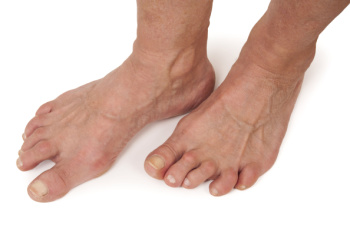Connect With Us
Blog

Rheumatoid arthritis, or RA, can manifest in various parts of the body, including the feet, where early detection is vital for effective management and prevention of complications. One common sign of RA in the feet is joint stiffness, particularly in the morning or after periods of inactivity, which can make walking and movement uncomfortable. Swelling and tenderness in the affected joints, often accompanied by warmth and redness, are also indicative of RA. Deformities such as bunions, hammertoes, and claw toes may develop as the condition progresses, altering the foot's structure and causing further discomfort. Additionally, RA can lead to nodules or lumps under the skin, typically around pressure points like the heels or toes. Changes in gait or difficulty in walking due to foot pain and stiffness are further indications of RA involvement. If you are experiencing symptoms of RA that are affecting your feet, it is suggested that you visit a podiatrist who can offer you relief and treatment strategies.
Because RA affects more than just your joints, including the joints in your feet and ankles, it is important to seek early diagnosis from your podiatrist if you feel like the pain in your feet might be caused by RA. For more information, contact one of our podiatrists of Southwest Podiatry. Our doctors will assist you with all of your podiatric concerns.
What Is Rheumatoid Arthritis?
Rheumatoid Arthritis (RA) is an autoimmune disorder in which the body’s own immune system attacks the membranes surrounding the joints. Inflammation of the lining and eventually the destruction of the joint’s cartilage and bone occur, causing severe pain and immobility.
Rheumatoid Arthritis of the Feet
Although RA usually attacks multiple bones and joints throughout the entire body, almost 90 percent of cases result in pain in the foot or ankle area.
Symptoms
- Swelling and pain in the feet
- Stiffness in the feet
- Pain on the ball or sole of feet
- Joint shift and deformation
Diagnosis
Quick diagnosis of RA in the feet is important so that the podiatrist can treat the area effectively. Your doctor will ask you about your medical history, occupation, and lifestyle to determine the origin of the condition. Rheumatoid Factor tests help to determine if someone is affected by the disease.
If you have any questions please feel free to contact our offices located in Dallas, and Carrollton, TX . We offer the newest diagnostic and treatment technologies for all your foot and ankle needs.

Congenital abnormalities of the feet encompass a variety of conditions present at birth, including clubfoot, rocker deformity, flatfoot, metatarsus varus, and pes cavus. Clubfoot involves the inward twisting of the foot, while rocker deformity presents as a prominent midfoot bump. Flatfoot refers to a collapsed arch, metatarsus varus to inward forefoot curvature, and pes cavus to an exaggerated arch. Radiographic images are essential in diagnosing and monitoring these conditions, providing detailed insights into bone alignment and structure. Treatment options vary depending on severity and type and may include bracing, stretching exercises, or, in some cases, surgical intervention. A podiatrist specializes in addressing congenital foot abnormalities, offering expert guidance, personalized treatment plans, and ongoing care to ensure optimal foot health. If you have a child born with a congenital foot problem, it is strongly suggested that you schedule an appointment with a podiatrist as quickly as possible for a proper diagnosis and treatment.
Congenital foot problems require immediate attention to avoid future complications. If you have any concerns, contact one of our podiatrists of Southwest Podiatry. Our doctors can provide the care you need to keep you pain-free and on your feet.
Congenital foot problems are deformities affecting the feet, toes, and/or ankles that children are born with. Some of these conditions have a genetic cause while others just happen. Some specific foot ailments that children may be born with include clubfeet, polydactyly/macrodactyly, and cleft foot. There are several other foot anomalies that can occur congenitally. What all of these conditions have in common is that a child may experience difficulty walking or performing everyday activities, as well as trouble finding footwear that fits their foot deformity. Some of these conditions are more serious than others. Consulting with a podiatrist as early as possible will help in properly diagnosing a child’s foot condition while getting the necessary treatment underway.
What are Causes of Congenital Foot Problem?
A congenital foot problem is one that happens to a child at birth. These conditions can be caused by a genetic predisposition, developmental or positional abnormalities during gestation, or with no known cause.
What are Symptoms of Congenital Foot Problems?
Symptoms vary by the congenital condition. Symptoms may consist of the following:
- Clubfoot, where tendons are shortened, bones are shaped differently, and the Achilles tendon is tight, causing the foot to point in and down. It is also possible for the soles of the feet to face each other.
- Polydactyly, which usually consists of a nubbin or small lump of tissue without a bone, a toe that is partially formed but has no joints, or an extra toe.
- Vertical talus, where the talus bone forms in the wrong position causing other bones in the foot to line up improperly, the front of the foot to point up, and the bottom of the foot to stiffen, with no arch, and to curve out.
- Tarsal coalition, when there is an abnormal connection of two or more bones in the foot leading to severe, rigid flatfoot.
- Cleft foot, where there are missing toes, a V-shaped cleft, and other anatomical differences.
- Macrodactyly, when the toes are abnormally large due to overgrowth of the underlying bone or soft tissue.
Treatment and Prevention
While there is nothing one can do to prevent congenital foot problems, raising awareness and receiving neonatal screenings are important. Early detection by taking your child to a podiatrist leads to the best outcome possible.
If you have any questions please feel free to contact our offices located in Dallas, and Carrollton, TX . We offer the newest diagnostic tools and technology to treat your foot and ankle needs.

Diabetes necessitates meticulous foot care to prevent potential and often severe complications. Prolonged high blood sugar levels can harm blood vessels and nerves in the legs and feet, leading to reduced sensation and inefficient circulation. Consequently, even minor injuries can escalate into severe issues, like infections, ulcers, or amputations. Podiatrists play an essential role in diabetic foot care, offering comprehensive assessments and personalized management plans. They conduct regular foot exams to monitor signs of nerve damage, foot deformities, or ulcers while providing expert guidance on proper hygiene, nail care, and footwear selection. Podiatrists also address concerns about foot health, emphasizing the importance of daily foot checks and prompt treatment for any abnormalities. They can assist in managing foot complications with specialized treatments to promote healing and prevent further deterioration in the lower legs and feet. Collaborating with patients, podiatrists develop personalized strategies for foot protection and risk reduction, stressing the significance of avoiding barefoot walking and quitting smoking to improve circulation. If you have foot problems caused by diabetes, it is suggested that you add a podiatrist to your medical team for regular checkups and treatment.
Diabetic foot care is important in preventing foot ailments such as ulcers. If you are suffering from diabetes or have any other concerns about your feet, contact one of our podiatrists from Southwest Podiatry. Our doctors can provide the care you need to keep you pain-free and on your feet.
Diabetic Foot Care
Diabetes affects millions of people every year. The condition can damage blood vessels in many parts of the body, especially the feet. Because of this, taking care of your feet is essential if you have diabetes, and having a podiatrist help monitor your foot health is highly recommended.
The Importance of Caring for Your Feet
- Routinely inspect your feet for bruises or sores.
- Wear socks that fit your feet comfortably.
- Wear comfortable shoes that provide adequate support.
Patients with diabetes should have their doctor monitor their blood levels, as blood sugar levels play such a huge role in diabetic care. Monitoring these levels on a regular basis is highly advised.
It is always best to inform your healthcare professional of any concerns you may have regarding your feet, especially for diabetic patients. Early treatment and routine foot examinations are keys to maintaining proper health, especially because severe complications can arise if proper treatment is not applied.
If you have any questions please feel free to contact our offices located in Dallas, and Carrollton, TX . We offer the newest diagnostic and treatment technologies for all your foot and ankle needs.

